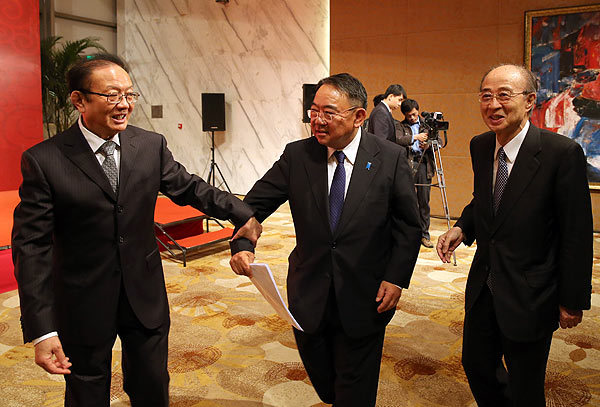Rebuild strategic mutual trust
By Wu Jinan (China Daily) Updated: 2013-10-26 07:54Political commitments of Japan and China and their joint documents are the basis to improve bilateral relations
Japanese Prime Minister Shinzo Abe delivered his second policy speech to the 185th session of the Diet on Oct 15 with a sense of what Japanese media called "pride". It is true that over the past 10 months since Abe reassumed the position of prime minister, the Japanese economy has seen a conspicuous economic recovery with the annualized growth rate 4.1 percent in the first quarter of this year and 3.8 percent in the second quarter, the highest among major developed economies.
A sweeping upper house election victory by Abe's ruling coalition in July after its landslide win in the lower house in December gave his coalition a majority in both houses and, the approval rate for the Abe Cabinet has remained at around 60 percent, a scenario seldom seen by his predecessors.
 From
From
left: Vice-chairman of the China Center for International Economic Exchanges Wei Jianguo, Japanese Ambassador to China Masato Kitera and former UN undersecretary-general Yasushi Akashi exchange ideas before the welcoming banquet at the Beijing-Tokyo Forum in Beijing on Friday. ZOU HONG / CHINA DAILY
But as former Japanese prime minister Yasuhiro Nakasone pointed out recently, the biggest weakness of the Abe Cabinet lies in its diplomacy. Since returning to power, Abe has visited 23 countries and "held more than 110 summit meetings in total". However, Japan's relations with its Asian neighbors have been strained, in particular, relations between Japan and China show no sign of improvement, instead they have slumped to near freezing point.
It is notable that Abe has repeatedly said since taking office that China-Japan relations are one of the most important bilateral relationships, and called for joint efforts from both sides to overcome the obstacles. However, this has been just lip-service as some of Abe's statements and actions have been challenges to China's core interests and prompted strategic concerns.
In fact, the Abe Cabinet's position over the Diaoyu Islands is much tougher than its predecessors and it has even considered stationing government workers on the islands. Japanese media have reported that Abe is likely to visit the Yasukuni Shrine by the end of the year, something his cabinet members have already done. Abe also said that the definition of aggression has yet to be established in academia or in the international community and claimed that he would not take on the "Murayama Statement" completely. All these statements and actions go against Japan's international commitments, as well as the tacit understanding and consensus reached by the elder statesmen of both countries.
Building strategic mutual trust between the great powers is a dynamic process, the beginning of which is based on their mutual commitments and tacit understanding of the norms of behavior and the consolidation and development of this trust depend on win-win cooperation. Strategic mutual trust is the necessary premise for cooperation and it will deepen as cooperation flourishes, but it can also collapse due to one party's unilateral actions.
For China-Japan relations to take a turn for the better, the most important thing is to rebuild strategic mutual trust between the two sides. Japanese politicians should speak frankly and sincerely and match their deeds to their words, rather than saying one thing and meaning another. To build strategic trust the two countries should focus on three things.











